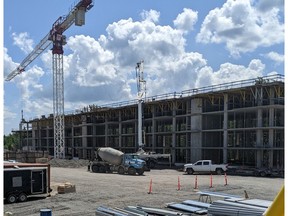Businesses want simpler building permit process: CFIB
Moncton is already streamlining process to make use of $15M in federal funding for housing during construction boom

Article content
The Canadian Federation of Independent Business says municipalities like Moncton can help address the housing shortage by simplifying their building permit process and red tape.
“We are challenging municipal governments to review their existing permitting and approval process to streamline them,” Duncan Robertson, senior policy analyst at the CFIB Atlantic office in Halifax, said Monday. “We are also challenging municipalities, provincial governments and the federal government to introduce two red tape reduction initiatives to help streamline housing, and make sure the impact of those initiatives are measured and reported on in terms of time and money saved. It needs t be measured so people can see the progress that’s being made, or not being made.”
Robertson said cutting fees and the number of forms businesses need to file in order to get simple building permits is part of a report called “Flushing Out the Nonsense,” which was released Monday as part of CFIB’s 15th annual Red Tape Awareness Week. The term “red tape” refers to government bureaucracy, rules and regulations.
Robertson said Canada’s housing shortage means buying a home is out of reach for many Canadians, and a lack of housing makes it difficult for employers in cities across the country who are trying to attract new workers. He said more housing is needed as close as possible to the places where people are working, especially in places like Moncton’s downtown core.
The CFIB report investigated what type of permits and costs are required for a $20,000 project to convert a simple powder room into a full bathroom in 12 major cities across Canada. It said the cities of Charlottetown, Halifax, Moncton and St. John’s were all below the national average in terms of forms required and permitting costs, but more work needs to be done.
“On average, seven additional documents are needed for a bathroom renovation project, with the average permitting costs just over $506,” the CFIB said in a news release Monday. “Out of the 12 municipalities examined, Charlottetown was found to have the lowest permitting cost at $180 and was tied with Edmonton and Calgary for the lowest number of forms required at five. Out of the remaining Atlantic cities permitting costs ranged from $579 in St. John’s to $230 in Moncton. In terms of number of forms required Moncton was the highest in the region requiring seven, while Halifax and St. John’s both required six.”
Robertson said cutting red tape around the permitting process will help build homes faster to meet their future housing needs. He said more than half of small business owners in the construction sector find it difficult to obtain or renew permits and/or licences. He said a survey also showed that 80 per cent of businesses agree that governments should review the necessity of permits and licenses.
Moncton is streamlining building bylaws
Bill Budd, director of planning for the City of Moncton, said the building permit process is already quite streamlined and most applicants can get their permit in five or six days. The city is now working on a new online development portal that will make it easier for contractors.
Budd said a new house would require a building permit, plumbing permit, site plan, drainage plan, and a complete set of drawings to show that your project meets all building codes. As buildings get larger, the process gets more complex, he said. There’s also a form that the property owner signs to promise that all requirements are met. When a project requires a variance to the law or rezoning of a property, it goes through the planning commission and a public hearing process where neighbours have a right to voice their concerns and objections. While it may seem onerous, Budd said the red tape is in place to make sure projects are done according to standards and building codes.
John Wishart, CEO of the Chamber of Commerce for Greater Moncton, said survey of business members last year showed that red tape for development was one of the concerns, along with the need for workers. Wishart said the city seems to be doing a better job than five years ago, as the number of building permits has high record levels.
The CFIB’s recommendations come as the City of Moncton is making changes to its own building bylaws to speed up construction of new housing. It was announced late last year that Moncton is receiving over $15 million from the federal government’s Rapid Housing Initiative. In a separate announcement in early January, the federal and provincial governments, along with the City of Moncton, announced over $6.7 million in funding, including $3.9 million through the third round of the Rapid Housing Initiative (RHI), to help build 46 new homes across two projects in Moncton.
More changes to the building approval process will go before council in February.
“As demand for housing continues to grow, the City is reviewing its development approval processes for opportunities to build more homes faster,” the city said in a recent statement. “Council is currently considering a series of amendments to its planning bylaws that would reduce the number of steps required to approve medium and high-density residential developments, while ensuring projects continue to meet the Zoning By-Law’s rigorous site and design standards.”
Last year, the City of Moncton had a total of 1,082 building permits with a total value over $341 million, compared to $256 million in 2019.
Kevin Silliker, director of economic development, said the building boom in Moncton has been driven mainly by multi-residential units financed by private investors. Silliker said the city needs to create approximately 1,000 new residential units each year to keep up with the demand posed by immigration. The number of new units grew from 957 in 2019 to 1,285 in 2022 and dropped slightly to 1,177 in 2023. More multi-unit buildings are now under construction.
The CFIB recommends that municipalities:
• Review their existing permitting and approval processes.
• Establish publicly available service standards for permit processing.
• Simplify and even automate certain processes.
The CFIB recommendations for federal and provincial governments to address red tape:
• Tying future funding for housing and infrastructure to requirements for a low administrative burden.
• Ensuring reporting requirements are set provincially where permit processing service standards are provincial too.
• Championing best practices.












Postmedia is committed to maintaining a lively but civil forum for discussion. Please keep comments relevant and respectful. Comments may take up to an hour to appear on the site. You will receive an email if there is a reply to your comment, an update to a thread you follow or if a user you follow comments. Visit our Community Guidelines for more information.